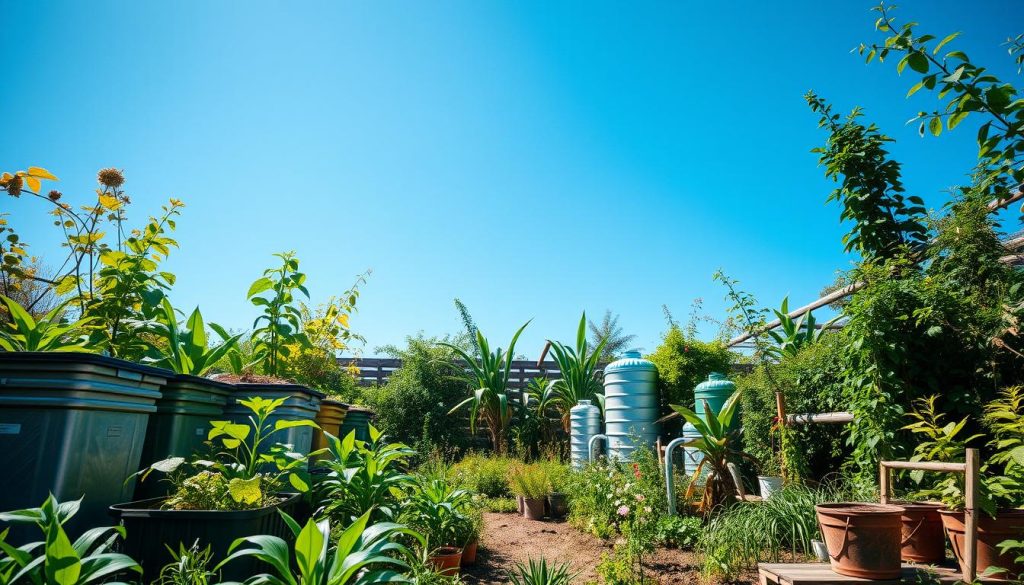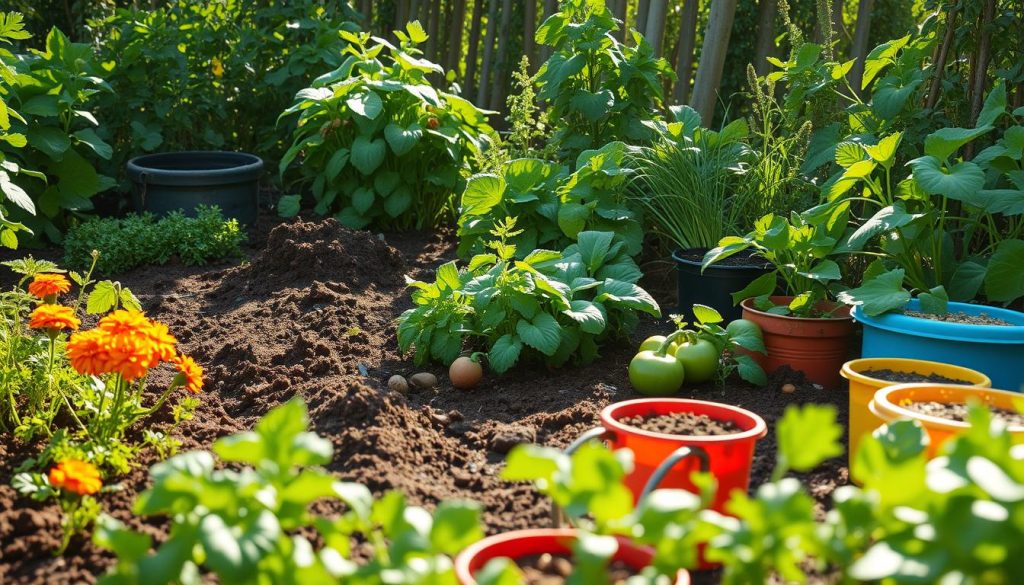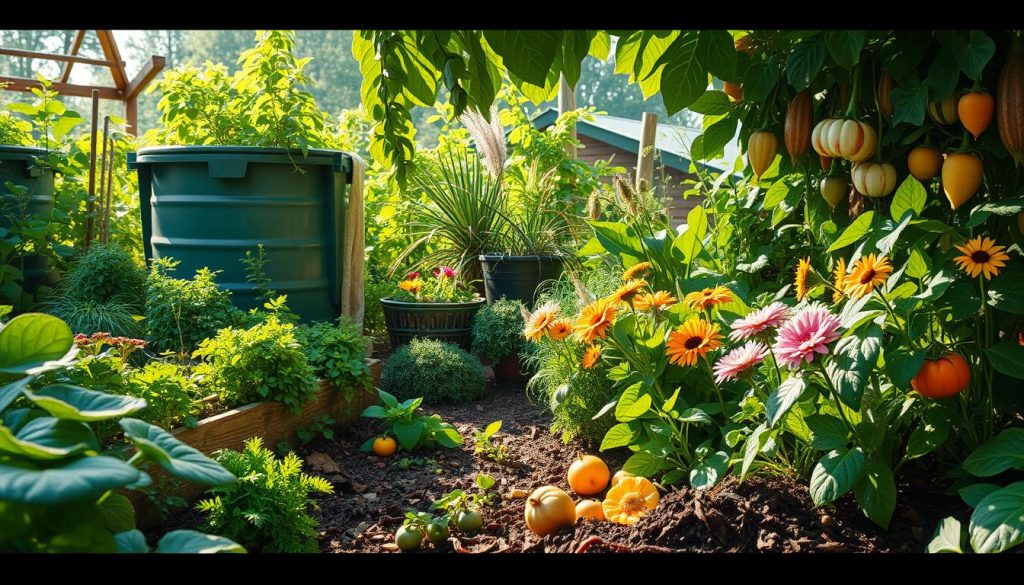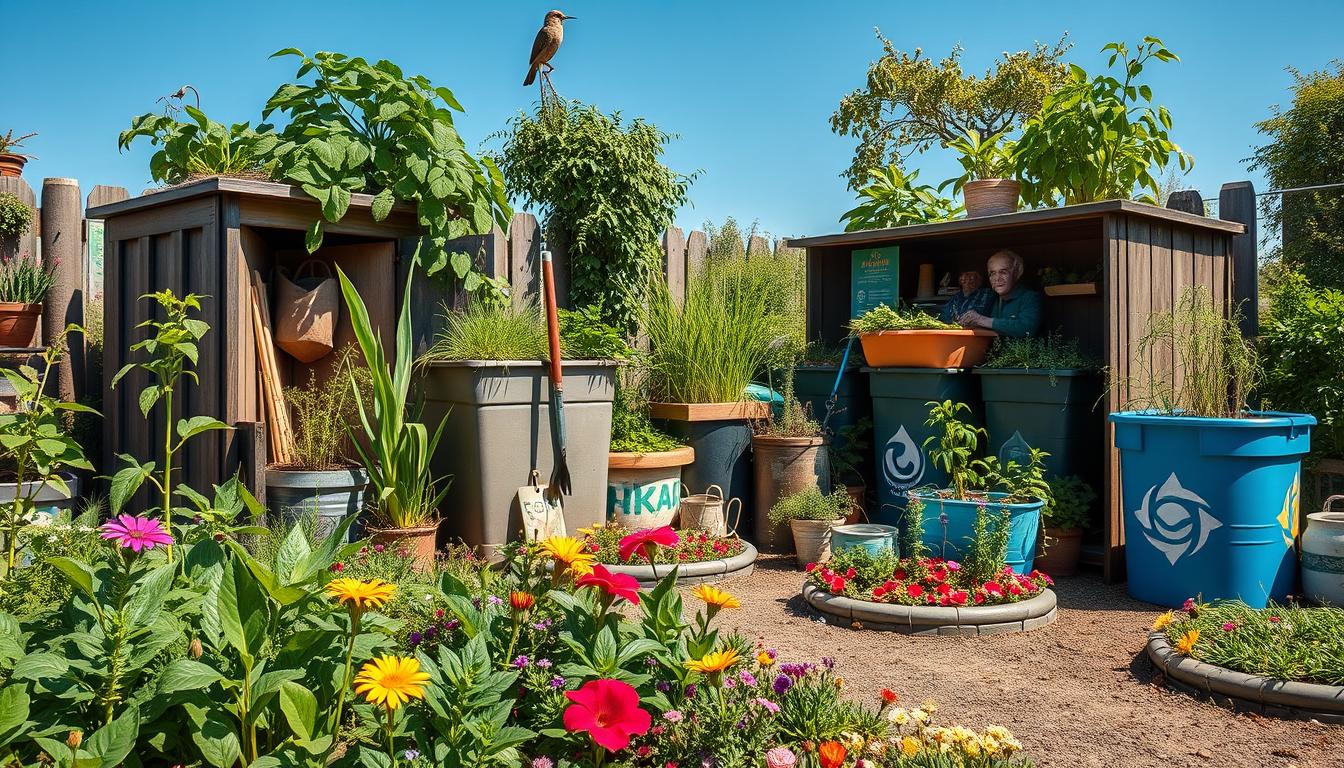I’ve found that zero-waste gardening is key because it lets me connect with nature. It also helps me use sustainable gardening practices. By following eco-friendly tips, I’ve turned my garden into a lush paradise.
This change has not only cut down my environmental impact. It has also greatly improved my health and happiness.
My experience shows that sustainable gardening is a big deal. It’s all about using less waste and saving resources. This way, I’ve built a better connection with nature.
I’m eager to share my journey. I want to encourage others to try zero-waste gardening. It’s a crucial step towards a greener future.
Understanding Zero-Waste Gardening
Exploring zero-waste gardening shows how crucial it is to cut down on waste. It not only reduces waste but also makes our environment healthier. By using zero-waste methods, gardeners can lessen their harm to the planet. This helps ensure a better future for all.
Composting is a big part of zero-waste gardening. It turns organic waste into soil full of nutrients. This means we don’t need synthetic fertilizers as much. It also cuts down on waste and lowers harmful emissions.
What Is Zero-Waste Gardening?
Zero-waste gardening means getting rid of waste in gardening. It uses natural stuff, saves water, and avoids chemicals. This makes gardening better for our planet.
Key Principles of Zero-Waste Practices
Some main ideas for zero-waste gardening are:
- Composting and reusing materials to cut down waste
- Using water wisely with good irrigation systems
- Choosing natural and biodegradable gardening materials
- Using fewer chemical products

By sticking to these ideas, gardeners can greatly reduce their harm to the environment. Composting is especially important. It helps a lot in reducing waste and making our environment healthier.
Why I Chose Zero-Waste Gardening
I switched to zero-waste gardening after learning about traditional gardening’s environmental harm. I found out that it can damage soil and pollute water. This made me look into organic gardening, which is better for the environment and promotes a healthy ecosystem.
My journey to sustainable gardening started with small steps. I began composting food waste and using natural pest control. As I learned more, I saw how it helped my local ecosystem. My garden became more diverse, and the soil got healthier.

My Personal Journey to Sustainable Gardening
One big challenge was cutting down on chemical fertilizers and pesticides. But, organic gardening helped me create a balanced ecosystem. It thrived without harmful chemicals. I knew I had to make a change for the better.
The Impact on My Local Ecosystem
Zero-waste gardening has many benefits:
- It reduces waste and pollution.
- It improves soil health and fertility.
- It boosts biodiversity and ecosystem balance.
- It saves water and other natural resources.
By making these changes, I created a sustainable garden. It’s good for the environment and makes me proud and fulfilled.
The Environmental Benefits of Zero-Waste Gardening
My journey to zero-waste gardening has shown me its big environmental benefits. Using zero-waste techniques, I’ve cut down on waste and saved resources. This makes my garden more sustainable and helps the local ecosystem.
It also joins a bigger effort towards green gardening. This is good for our planet.
Some key benefits of zero-waste gardening are:
- Less waste ends up in landfills
- Water and other resources are saved
- Natural habitats for local wildlife are created
Zero-waste gardening helps soil health naturally. This means less need for harmful chemicals. It also boosts biodiversity, helping many plants and animals thrive.

My research shows zero-waste gardening is good for the environment and the community. Sharing knowledge and resources inspires others to go green. This creates a wave of positive change.
How Zero-Waste Gardening Saves Me Money
Adopting sustainable gardening practices has cut my environmental impact and saved a lot of money. I’ve found that eco-friendly gardening tips, like composting and reusing materials, are key. For example, I make my own compost from food waste and yard trimmings. This cuts down on expenses and offers a natural alternative to store-bought fertilizers.
Some cost-saving strategies I’ve added to my gardening routine include:
- Repurposing old containers and materials to create planters and garden features
- Using rainwater collection systems to reduce water consumption
- Creating my own pest control solutions using natural ingredients
These sustainable gardening practices have not only saved me money but also cut down on chemical use and waste. By following eco-friendly gardening tips, I’ve made my garden more self-sufficient and eco-friendly. It’s good for my wallet and the planet.
As I keep exploring new sustainable gardening practices, I’m looking forward to more savings and benefits. I hope to inspire others to adopt eco-friendly gardening habits. Together, we can create a more sustainable future.
Tips for Starting My Zero-Waste Garden
To start a zero-waste garden, think about composting and reducing carbon footprint. These steps help make a garden that’s good for the planet.
Choosing the Right Plants
When picking plants, I look for those that waste less and need less care. Some good choices are:
- Native plants that fit well with the local weather and soil
- Plants with deep roots to prevent soil erosion
- Plants that attract pollinators and other helpful insects
Practical Techniques for Composting
Composting is key in zero-waste gardening. It turns waste into soil that’s full of nutrients. I mix food scraps, leaves, and grass clippings in my compost pile.
By turning the pile often and keeping it moist, I make great compost. This compost makes my soil better and cuts down my gardening’s carbon footprint.
Inspiring Others Through Zero-Waste Gardening
Zero-waste gardening has changed my life, and I want to share that with others. I believe in building a community of gardeners who care about the planet. Together, we can make a big difference in our gardens and the environment.
Building a Community of Eco-Conscious Gardeners
My gardening journey has shown me the value of sharing and supporting each other. I’ve met others who love zero-waste gardening, and we swap tips and advice. This community keeps us motivated and reminds us why we started.
Sharing My Success Stories and Challenges
I share my gardening highs and lows to inspire others. It’s exciting to harvest a lot of food or learn from mistakes. These stories make gardening seem more achievable and encourage people to start their own sustainable gardens.

